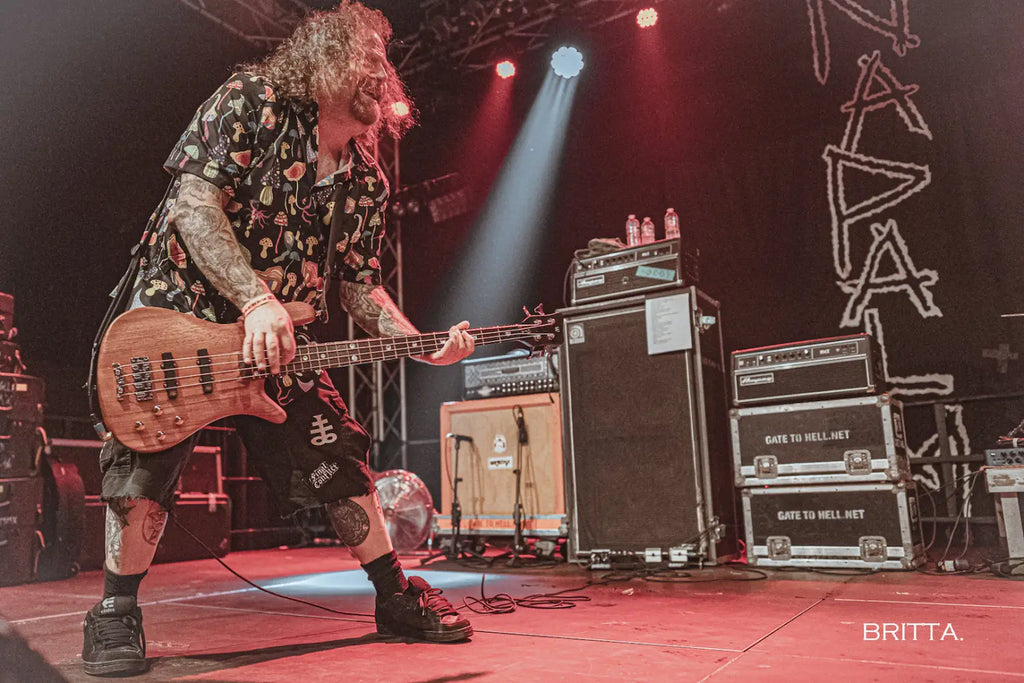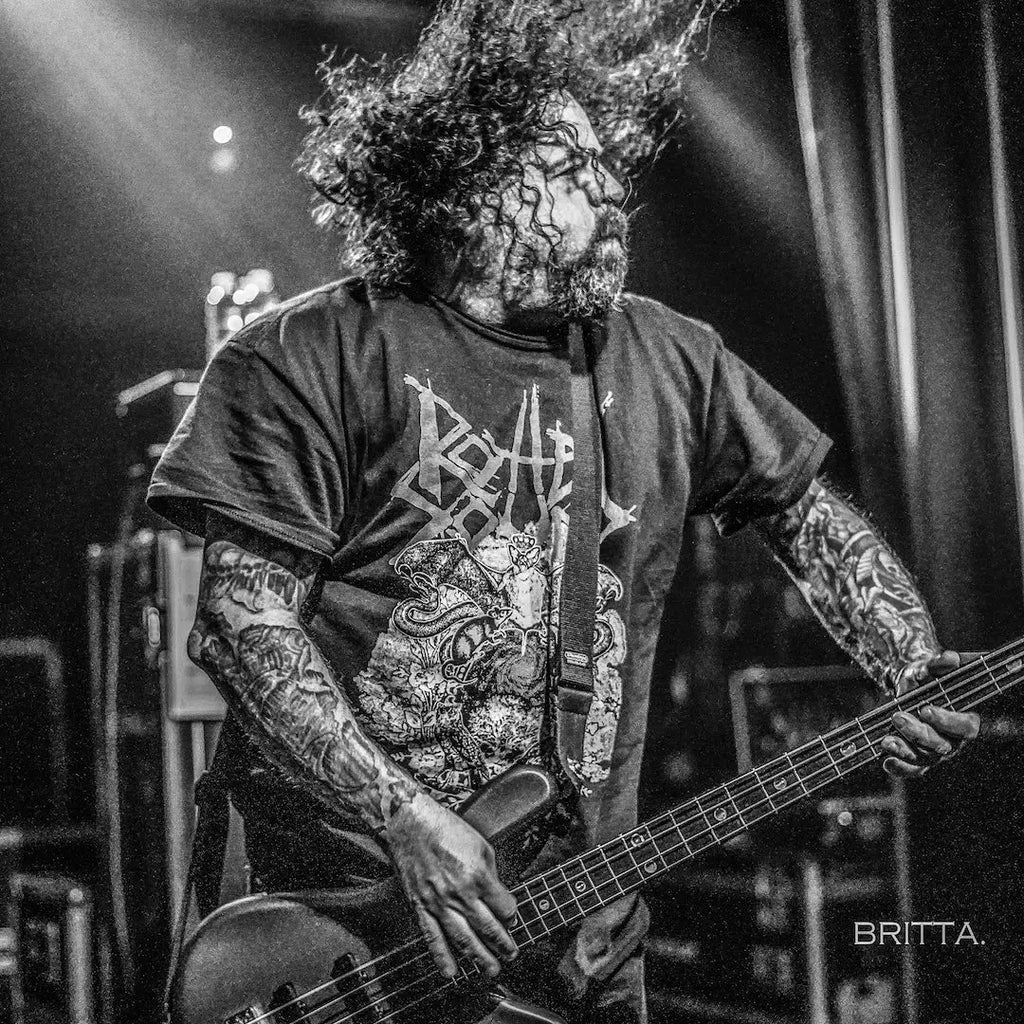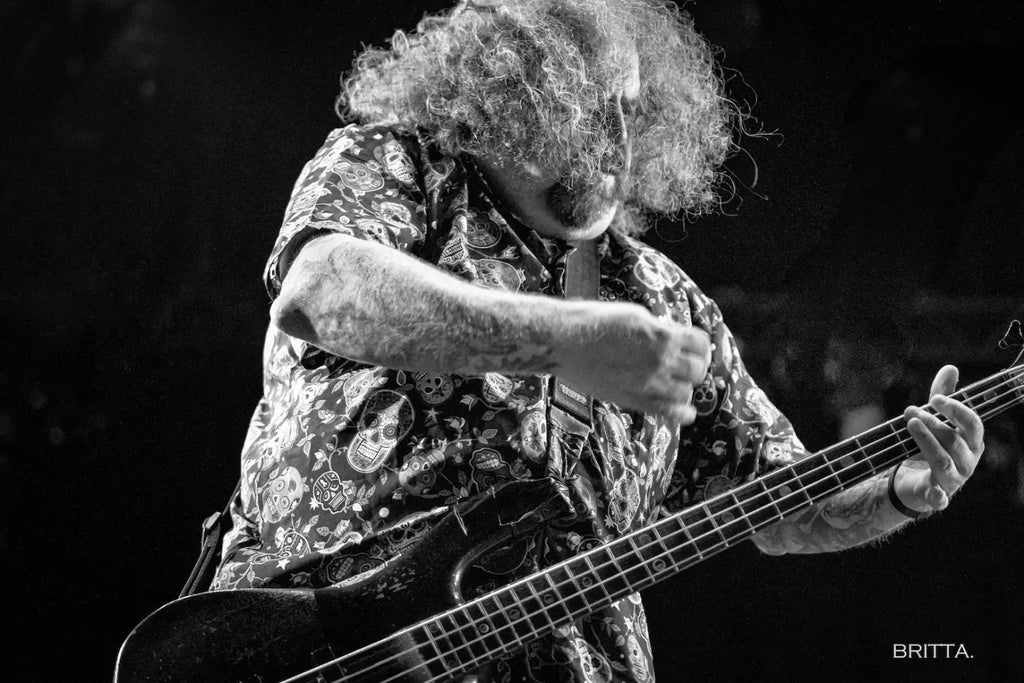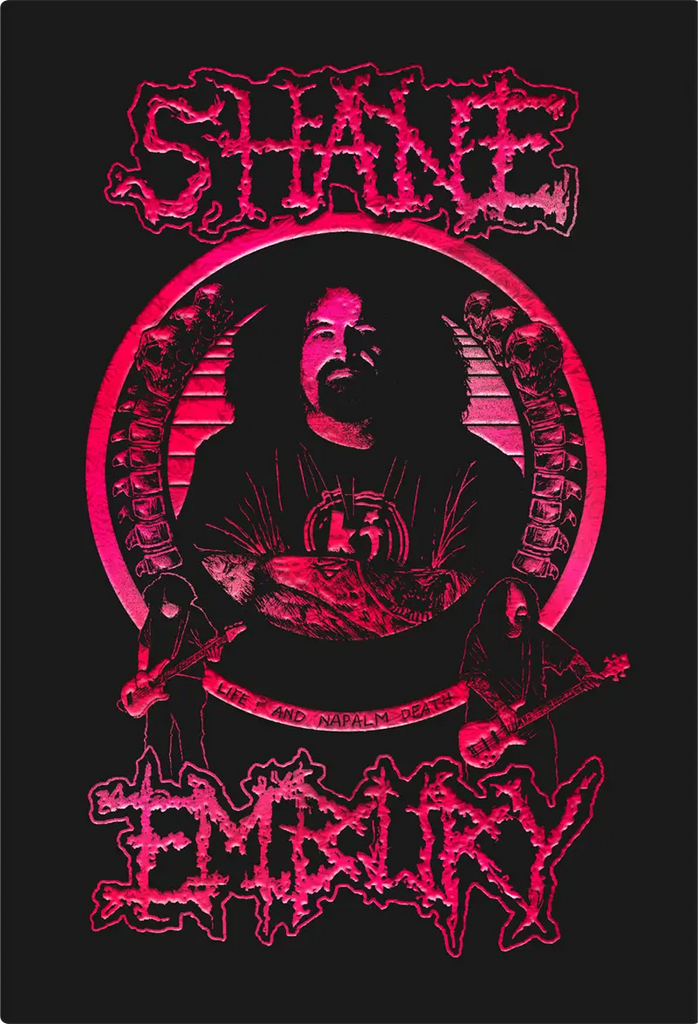All Photos by BRITTA
Napalm Death have one of the holy grail careers in heavy music, a band who pioneered genres, keep widening the goalposts of what those genres can be, and became and remain icons for their continued steadfastness and strength, even penetrating mainstream culture to a degree whilst being the byword for challenging and ear-shredding extreme music.
That's the short version that doesn't tell the whole story, the highs and lows of a career being industry underdogs, the times where the creative future of grind's most creative band has been in doubt and the fiery dynamics within the band that both threatened and saved it.
The best person to tell this story is of course Shane Embury, the bassist who joined his favourite local noise band in 1987 right after the recording of their epoch-defining debut Scum and has been a primary musical force behind everything they've done since.
His book Life...? And Napalm Death chronicles the path that has made the band what they were are from his own perspective, taking in music with Lock Up, Brujeria, Venomous Concept, and about a million more along the way, and his own journey growing up through grindcore. For a further dive into the subjects and stories raised through the book, we sit down with the unmistakeable engine behind a thousand ferocious riffs.

Photo by BRITTA
First question to ask is why write a book now at this point in your career and life?
Embury - I keep on pondering it myself. This house where I am is my studio, and where Danny Herrera from Napalm spends time when he’s not in LA, but almost the whole band lived here at one point in time and there are so many photos and memories here, for years.
The pandemic came in and all of a sudden I’m at home for two and a half years which I’ve never experienced before, and I certainly did freak out about not knowing what to do. I jumped into music heavily as a way of dealing with it as I always do, I never did it to make money but it became part and parcel with my existence, but I wanted to keep experimenting with different media and so it was suggested to me with a publishing deal if I would be interested in doing a book.
The main thing I thought was “fuck it, why not?” It seemed a challenge, it seemed a natural step. My memory is reasonably intact for that kind of thing. My wife could ask me “where’s the so-and-so” and I have no bloody idea, but you ask me about a date and what we did with the band I know. I still remember the first day I saw Napalm Death vividly as if it were yesterday.
All of a sudden my stockpile of photos here that were sat there gathering dust seemed to have more importance than ever, and it seemed a natural time because Napalm Death has been my life and is very important to me, but at the same time I’m not so sure if my life is as constantly on the road as it was. I’ve always been on the road, if not with Napalm then with Brujeria or someone else, 7 or 8 months a year when you add it all up. I’ve been trying to bring balance to my life a bit more and I thought maybe this is a good point to make a document of how far I’d come.
Many people, when they think about a heavy metal book or a film will think of the rock ‘n’ roll excess which might in those texts overshadow the actual creative side, but in the book you take the time to talk a little bit about every single Napalm Death album on top of your other projects. Did you aim to hit a balance with your writing between the personal narrative and the stories along with the story of the actual music you’ve made?
Embury - Of course there were the crazy times and that aspect to being in a band, but you get to the point where we are now after sixteen albums and it’s been such a twisting and turning of where our heads were at making those records. Some people know those things but other people don’t, and it’s my particular version of it which if we asked Barney I’m sure would be a slightly different version, especially in the mid-90s where there was a period of unrest with where we were going. Of course Napalm Death is a very socially conscious band too but also we are human beings and we like to have fun so there’s the balance of that too and presenting the human sides to us.
For a lot of people, Napalm Death have been such a consistent part of the heavy music world for around forty years now and particularly for younger generations for whom you have always been there as these stalwarts, and so they might not know about the conflicts that have existed in the band where some other bands the drama might be the first thing that comes to mind.
You shed light in the book on a handful of times where the band has come close to breaking up and has had major differences, so is it interesting for you to consider and perhaps dispel a little bit the public image of Napalm Death as this band who have never really had these bumps along the road?
Embury - It’s not like you sugercoat things but I think over the years we’ve just got on with it and dealt with it, as opposed to band drama being something exposed everywhere. The book though, has to have these multi-faceted angles, and I’m not quite sure where my future is going right now. Musically and creatively all manner of things have happened that I’m interested in being involved in.
For me and the band to move forward in a harmonious way, which it has been largely more recently, sometimes you have to go through these almost complete break-ups. So many bands have bust-ups with their management or their record label, and reflecting on all of that honestly does raise these points where Napalm might have just called it a day.
Certainly before we signed the deal with Century Media I really thought we were close, and not because we were angry with each other but things had just ground to a creative halt. Everybody has their part to play in Napalm Death but mine is the creative drive, and everything has to be moving forward. But we were young too, and I look back sometimes and think “did we really argue about that?” “Where we so fixated on a particular drum roll that it upset Danny and traumatised the poor guy for months to come?” Now I’m not like that, and a lot of the last album came together in the studio more organically, which is how I want to move forward and more how I think bands did it in the past.

Photo by BRITTA
There’s a lot in the book dedicated to the ups and downs in your relationship with Barney in particular and you two have been these two pillars of Napalm Death for so long but come at that in different ways and have had to weather that and keep that alive to the present day.
Embury - We’re so close and yet so far apart at the same time somehow, best of friends but different people. Especially with today’s way of communicating you can get afraid of having to pick up the phone and call somebody when you really you shouldn’t be, and I’m always a bit like that anyway. I want to say my piece but I don’t want to upset anybody and go through such a battle sometimes. Lately we take our time to assess what we’re going to say more. When we were a five-piece it was really difficult because with Mitch Harris in the band with us, we were all quite fiery individuals and it was very easy for something to go from 0-60, but that passion drove the band.
One feature of the book is after your chapters, it will cut to an Eye Witness Report contributed by somebody who you have worked with along the way, which is quite unusual for an autobiography - which is normally one person’s perspective. What was it like for you getting all of these other people to have their say in your book, and how did you even narrow down who was going to be part of it?
Embury - There’s a few people for sure who I would have liked to have been involved. My sister’s point of view was interesting, because even though she’s my sister she probably told me more in the book about how she worried she was about me than she’d tell me face-to-face. I think it’s important to have other people’s perspectives and interesting to see what they think of me, I suppose. I was expecting it to be harsher to be truthful, they were all quite kind!
Anton Reisenegger talks about the darker side of my personality sometimes and certainly when I was drinking that would come into my play, but I thought those were key points to put in and not present some holier than thou picture because I’m not. There were a few more people who I’d liked to have got, and maybe if people like the book that’ll be an expanded edition!
You mentioned that prior to the time you signed the Century Media deal was maybe the band at its most unsure point. Enemy of the Music Business was seen as this reinvigoration which has continued through all of the records you have done since to the present day, but that was 12-13 years after Scum and From Enslavement to Obliteration, whereas we are now 23 years from that record. How has that been as a mantle to keep up over such a long period of time?
Embury - A number of things have certainly happened, haven’t they, and when we did Enemy it was being kickstarted by the second or third generation grind bands at the time like Nasum. Me and Barney wanted to move forward fast again, and Mitch wanted to keep going in that more mid-paced way a bit more at first but was able to swing back into writing that kind of music again which we does really well.
Prior to that towards the end of the Earache relationship, there were people with us who just had their own things going on and it wasn’t productive for our thinking. Industry and record labels are one thing but you have to always bring it back to you, which is the band, and you have to be solid with a single vision. From Enemy Napalm Death has moved onto albums where it’s still extreme and fast but there’s also loads of weird nuances, and I want strange alternative noise parts and weird ambience to come in and out and create dynamics, but you want to be a contained unit moving forward and certainly in the 90s we were skewed in different directions.
It’s been quite a long gap now because Throes we started laying down the music on in 2017, and it didn’t come out till 2020, so I’m very eager to start work. I’m the sole music writer now that Mitch is departed, but I seem to be getting crazier as I get older.

Photo by BRITTA
With Nasum and Converge being referenced as newer bands who came through and gave you a kick to step up your game, does that still happen for you?
Embury - When we were younger people would ask me if I think Napalm Death is the most extreme band, and my 23 year-old self would say yes, but now I never would say that because music mutates constantly. I got into Slade and Sabbath but once you take these influences you’re gonna mutate it and there’s endless possibilities.
When my band Lock Up played with Converge in Japan me and Tomas Lindberg looked at each other thinking there was no fucking way we were gonna follow that band. They were so on fire and Jane Doe is an insane record, but that’s good. I’m not scared of those things, it makes me think I need to incorporate a bit of that energy. Nasum and 324 from Japan were very traditional grind bands but with an energy. Anaal Nathrakh were always one, and I always liked how Mick Kenney would master his records with a little touch of distortion which gave them that edge. I’ll get things like that from crazy drum and bass like Squarepusher with some nutty drum beat going off.
One of the interesting throughlines of the book is the obvious limitations in Napalm Death’s pop commercial appeal and being treated as a bit of a novelty by the mainstream media, but at the same time having these insane experiences playing to arenas of thousands of people in Russia or South America. How would you speak to that duality?
Embury - The extremity and the message especially cuts through multiple languages. We were constantly obsessing over our direction and where we were going, and sometimes we would get frustrated that we didn’t feel people got it, but we carried on and you’d get to those instances of Russia or South Africa that you never believed you would reach.
Recently we played a few shows with Volbeat which was completely different to what you do. We recently played in Melbourne and Boy George came down to see us throwing the horns, which to me was bizarre as I grew up listening to Culture Club with my friends, and it’s surreal when those things happen but also nice when people start to appreciate different kinds of music.
I like to explore and check out different stuff and the world musically has become a little bit more open to what perceivably could be catchy. The track Amoral from the latest album is very catchy, but you don’t go out of your way to do that. There’s some interesting stuff going on right now which I can’t really say too much about but I’m flipping out still about what’s potentially on the horizon for Napalm Death to do sonically.
It’s interesting to hear you talk in the book about how the political side of Napalm Death is not the area you would describe as being your expertise. How do you feel about Napalm Death’s legacy of being a big proponent of progressive social change in heavy music?
Embury - It’s really important, and I’m happy and proud of these achievements. The issues of trans-rights and things like that at the moment, to me everyone is cool and it’s common sense to be loving and compassionate. I come from a really small village where things could be intense when I was growing up, and I’m happy that Napalm promotes free thought, love, understanding, tolerance, and Barney talks about these things rather well.
I like to explore the creativity of music and how that channels positive emotion, and I like to be a bit private. Barney does a good job of promoting the band’s understanding of what we hope the world will be and what people will take from us. To me, it’s common sense. The world was a scary place when I was growing up and it’s even scarier now. It’s run by madmen and the news wasn’t as 24/7 then, and I still seek shelter if I’m honest.
You have been the longest-running link to Napalm Death’s early past. Did writing this book and putting all of these feelings down on paper help you realise any further why it is, through all those times that Napalm Death has nearly called it quits or you have become interested in other things, that you have had to keep being in Napalm Death?
Embury - It’s vitally important to me, I suppose. Even if I’m not always on stage with the band it’s a massive part of my driving force, and I think Napalm has so much more to do musically. I never rest and Napalm was the band that gave me purpose, and so many wondrous things have happened because I was in Napalm.
I was quite shy and reclusive and I learned more through Napalm Death traveling the world than anything else. I met my wife through the band, I have my children because of Napalm Death, I have bandmates who are brothers and family. That’s why I stay with Napalm Death. It’s necessary to existence.





